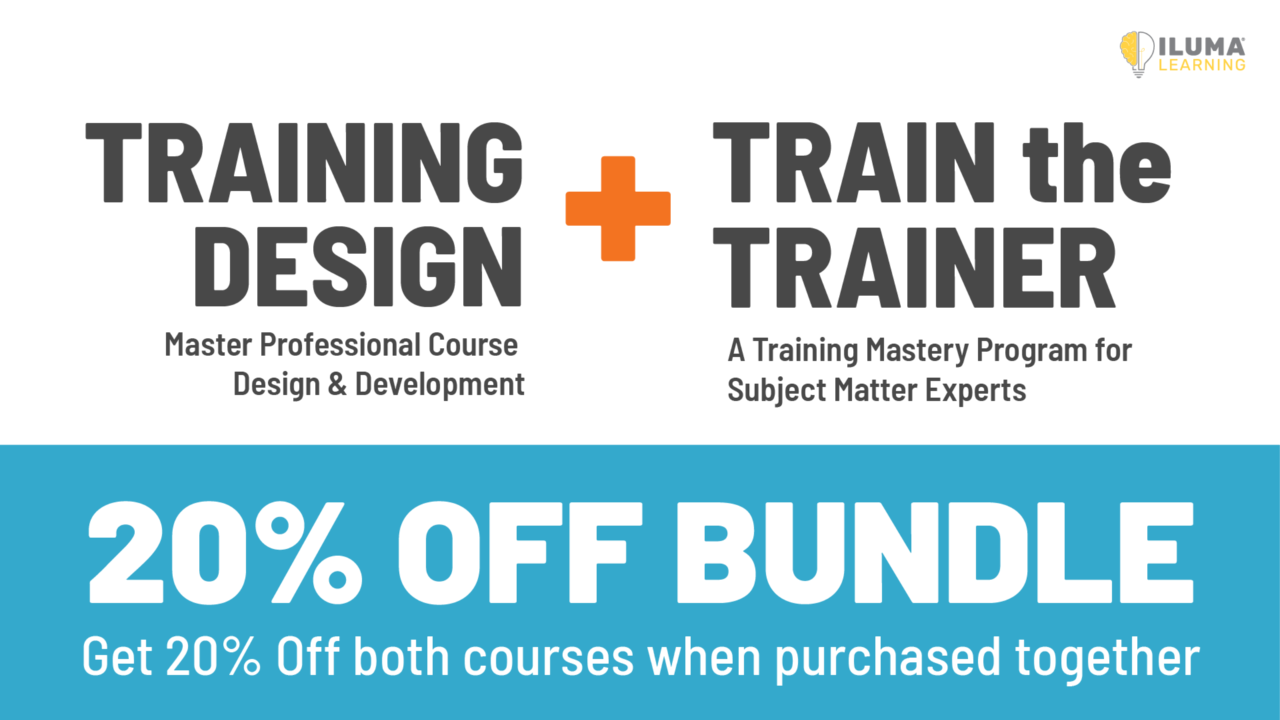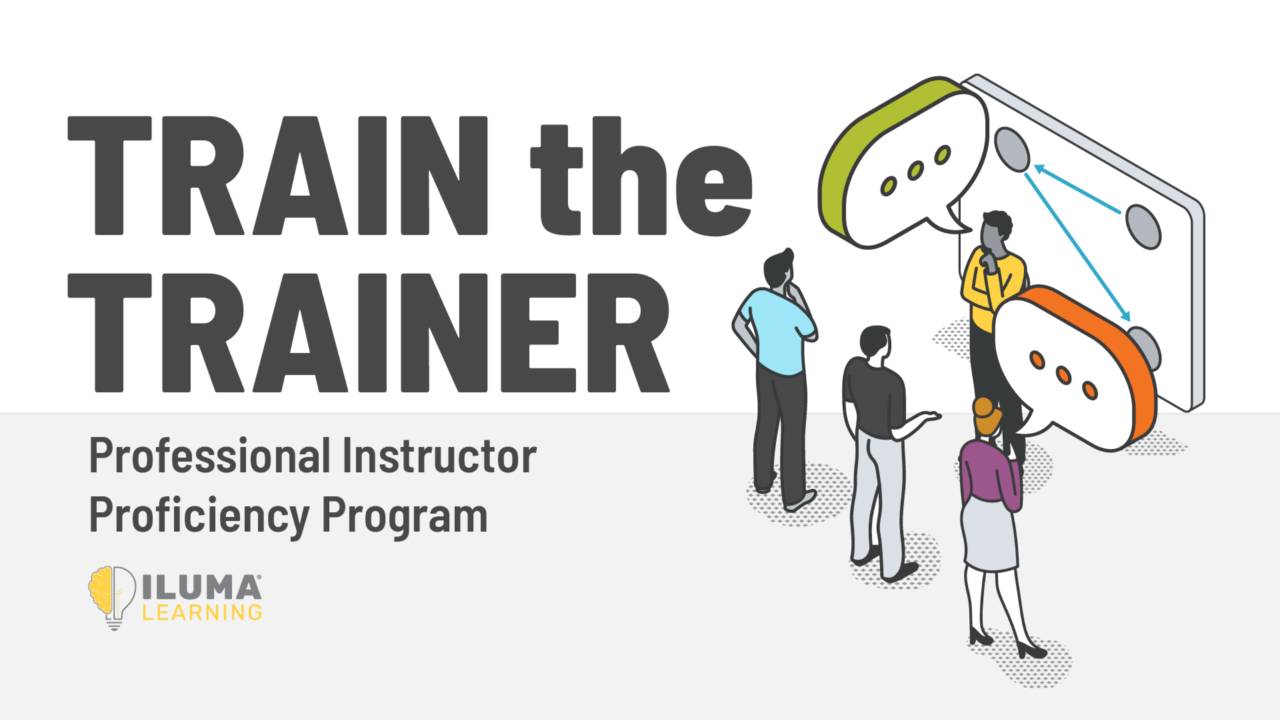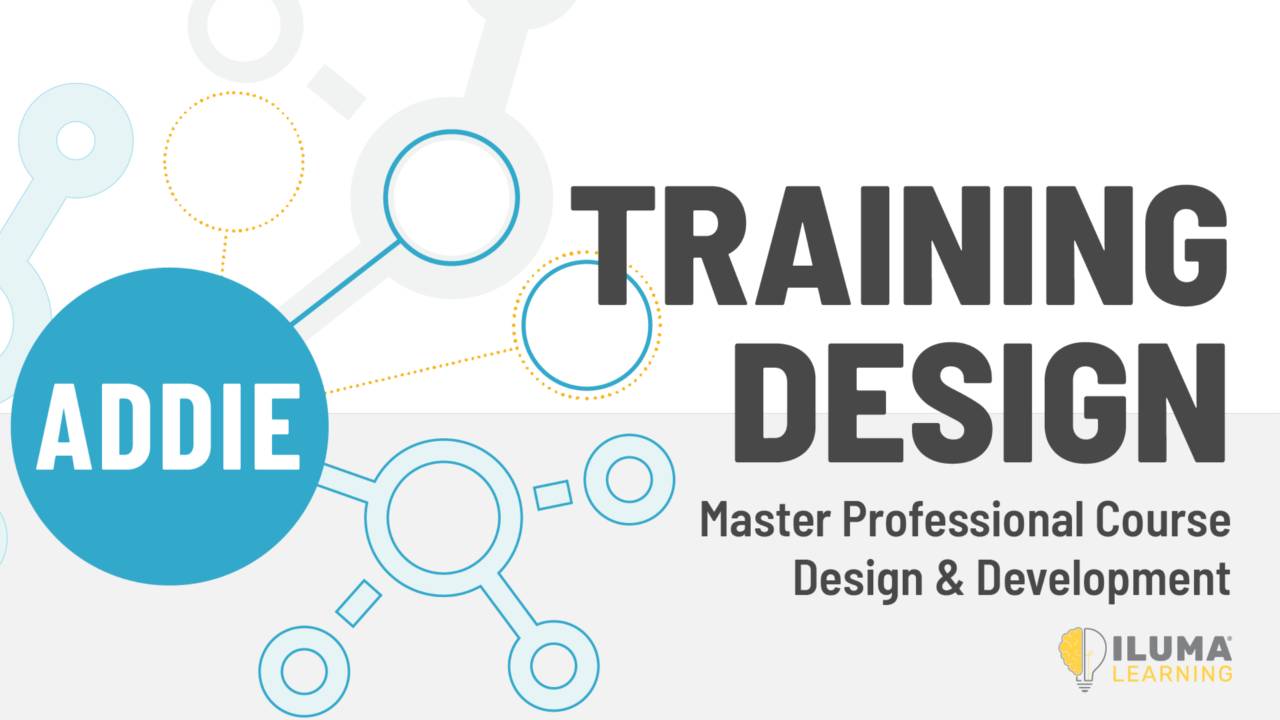
Course Bundle for Trainers
Receive 20% off both courses when you purchase the Training Design course and the Train the Trainer course together.
Note: if you're purchasing this course for someone else, click the "Send as a gift" button at the top of the checkout area.
What you receive:
- Full access to both online courses
- Train the Trainer: Training Mastery for Subject Matter Experts
- Training Design: Master Professional Course Design & Development
- An Interactive PDF Course Guide & Workbook for each course (x2)
- Three one-on-one coaching sessions
- A one-on-one training mastery coaching session (1 hour video meeting)
- A one-on-one training design coaching session (1 hour video meeting)
- A one-on-one coaching review session at the end of the course: receive feedback on your completed practice training course project (1 hour video meeting)

Train the Trainer
-
Course Introduction
1 lesson- Welcome to the Course
-
Creating Context
9 lessons- Creating Context Introduction
- How Learners Learn
- Andragogy & Pedagogy
- Context & Comprehension
- Re-sorting and Un-learning
- Context as the Foundation
- Creating Context Overview
- Context Application Assignment
- Creating Context Summary and Further Exploration
-
Facilitating Different Personality Styles
12 lessons- Facilitating Different Personality Styles Introduction
- The Action Style
- The Structure Style
- The Relationship Style
- The Possibilities Style
- The Four Questions
- Your Personality Style
- Communication Styles
- What to Watch Out for Based on Your Style
- Facilitating Different Personalities Conclusion
- Facilitating Different Personalities Application Assignment
- Facilitating Personalities Summary and Further Exploration
-
Communicating
9 lessons- Communicating Introduction
- Effective Communication with Body Language
- Body Language Continued
- Presenting with Confidence
- Overcoming Your Fears
- Giving Direction
- Communicating Overview
- Communicating Application Assignment
- Communicating Summary and Further Exploration
-
Learning Culture
7 lessons- Learning Culture Introduction
- Defining Culture
- Learning Culture Overview
- Setting Up Your Learning Environment
- Technology and Supplies
- Learning Culture Application Assignment
- Learning Culture Summary and Further Exploration
-
Increasing Participation
9 lessons- Increasing Participation Introduction
- Examine the Classroom Climate
- Encouraging Your Quiet Students to Participate
- Managing Different Skill Levels
- From Distracted to Discovering
- Making Learning Active
- Increasing Participation Overview
- Increasing Participation Application Assignment
- Increasing Participation Summary and Further Exploration
-
Managing Difficult Questions & Participants
11 lessons- Managing Difficult Questions & Participants Introduction
- Managing Difficult Questions
- Meeting Classroom Challenges with Action
- Managing Competitive Participants
- Keeping Things from Going Off Track
- Keep Your Cool
- Managing Difficult Participants
- The Know-it-All
- The Arguer
- The Complainer
- Final Thoughts on Managing Difficult Questions & Participants
-
Learning Styles
10 lessons- Learning Styles Introduction
- The Visual Learning Style
- The Auditory Learning Style
- The Kinesthetic Learning Style
- Your Learning Style
- Learning Styles Overview
- Enhancing Comprehension Through Exercises and Activities
- Active Through the Three Styles
- Learning Styles Application Assignment
- Learning Styles Summary and Further Exploration
-
Applying Adult Learning Sciences
10 lessons- Applying Adult Learning Sciences Introduction
- Creating Meaningful, Useful Training Programs
- Autonomy
- Collaboration
- Self-direction
- The Five Pillars
- Using Life Experience as a Training Tool
- the What and the Why
- Adult Learning Sciences Application Assignment
- Applying Adult Learning Sciences Conclusion

Training Design
-
Training Design Introduction
5 lessons- Introduction
- The Curriculum
- Shared Authority
- The ADDIE Model Process
- Training Design Summary and Further Exploration
-
ADDIE Analysis
11 lessons- Analysis Introduction
- Analysis First Steps
- Getting Clear
- Practice Training Course Introduction
- Learning Objectives
- The Three Learning Domains
- Categorizing the Three Domains
- The ABCD Method
- PTC: Write Your Learning Objectives
- ADDIE Analysis Final Thoughts
- ADDIE Analysis Summary and Further Exploration
-
ADDIE Design
12 lessons- ADDIE Design Introduction
- Keep it Active and Balanced
- Mind Mapping
- PTC: Create a Mind Map
- Creating a Structured Outline
- PTC: Create an Outline
- Designing Activities
- PTC: Designing Activities
- PTC: Adapting Activities for all Learning Styles
- Assessing Levels of Understanding
- PTC: Plan your Assessments
- ADDIE Design Final Thoughts
-
ADDIE Development
10 lessons- Development Introduction
- Developing Your Course
- PTC: Development Preparation
- PowerPoint ProTips
- PTC: Create PowerPoint Slides
- PTC: Video Demonstration
- Creating Activities and Labs
- PTC: Test Your Learning Activities
- Step Back and Review
- Teaching Online
-
ADDIE Implementation
6 lessons- Implementation Introduction
- Putting it Into Action
- Being Flexible
- Handling the Curve Balls
- Keeping Your Participants Engaged
- ADDIE Implementation Final Thoughts
-
ADDIE Evaluation
9 lessons- Evaluation Introduction
- Evaluation Methods
- Structuring Your Written Assessment
- PTC: Writing Written Assessment Questions
- Continuous Improvement Through Assessment
- PTC: Writing Evaluation Questions
- Kaizen Your Course
- Things to Look Out For
- Never Stop Improving

